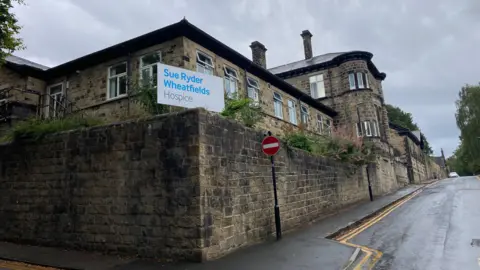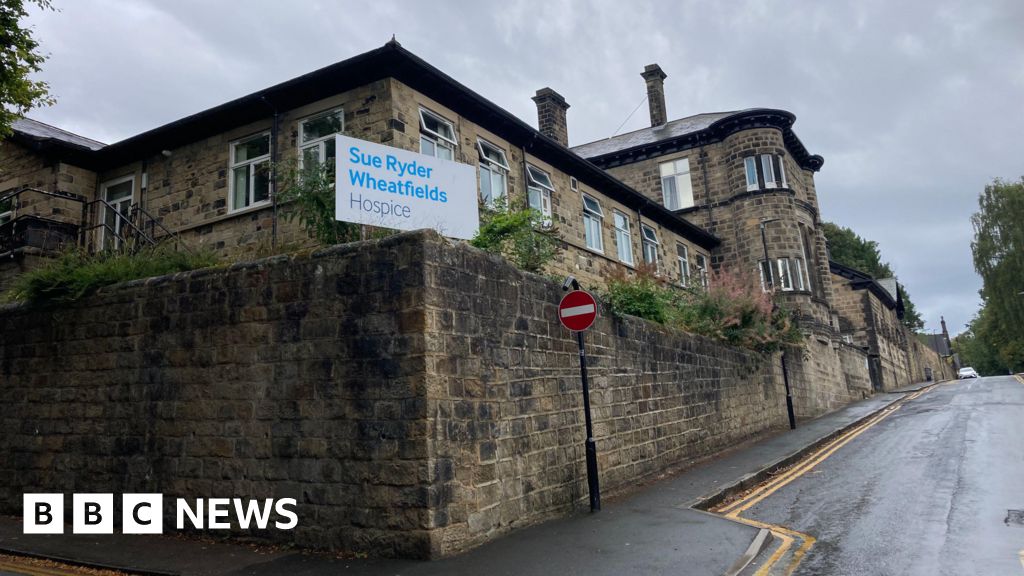Julia Bryson
BBC News, Yorkshire
 Cathy Minton/BBC
Cathy Minton/BBC
The regulator said staff at the hospice were let down by the leadership team
A Leeds hospice has been put into special measures after it was rated inadequate by the Care Quality Commission (CQC).
Sue Ryder Wheatfields Hospice in Headingley was inspected by the regulator in March and May, after concerns were raised about the quality of care being provided.
The CQC said that although staff were kind and worked hard to care for their patients, they were let down by leaders who had not investigated when things went wrong.
James Sanderson, chief executive at Sue Ryder, said the report was “misleading and unnecessarily alarming”, adding that a significant number of the CQC’s findings were “factually inaccurate”.
Linda Hirst, CQC deputy director of operations in the North, said during the inspections, leaders “didn’t respond effectively to concerns about understaffing and low morale, which impacted on people’s care”.
She added: “Staff also said they were frequently unable to take breaks as it placed people at risk due to their being no cover.
“This staff dissatisfaction led to many leaving the service and others planning to leave.
“Staff also reported that leaders put pressure on teams to take new admissions into the hospice regardless of the service being understaffed which placed people at further risk of harm.”

It cares for adults with life-limiting conditions and those at the end of their lives
The report found that in addition to these concerns, people did not always receive their medications on time as there was only one nurse on shift – meaning some people were in pain while they were waiting.
Ms Hirst said: “Leaders didn’t listen to people’s preferences, and care delivery was very task-focused with little consideration of people’s values, aspirations or goals.
“Staff wanted to spend more time with people but didn’t have time due to excessive workloads.”
The hospice on Grove Road provides inpatient and community palliative care services for people with life-limiting conditions, and those who are approaching the end of their lives.
Inspectors found leaders did not ensure staff had the right skills, qualifications and experience to meet people’s needs.
They also found that leaders failed to support and supervise staff to ensure they were competent in their roles, and did not always consult with staff and people when there were reductions in service.
These included the closure of the day centre and the loss of palliative care social workers and nurse-managed beds.
As well as this, the hospice did not always follow infection prevention control measures.
‘Lack of context’
It was previously rated good in all five areas of being safe, effective, well-led, caring and responsive.
Following the CQC inspection, it was rated inadequate in the safe, effective and well-led categories.
It was rated requires improvement in the caring category, and remained good in the responsive category.
The CQC placed the service into special measures – which involves close monitoring to ensure people are safe while improvements are made.
Special measures also provided a structured timeframe so services understood when they needed to make improvements by, and what action the CQC would take if this did not happen, the CQC said.
The CQC has also begun the process of taking regulatory action to address the concerns which Sue Ryder has the right to appeal.
Mr Sanderson said: “Sue Ryder is very disappointed with the CQC report into Wheatfields Hospice, which we believe is misleading and unnecessarily alarming.”
He said the hospice was in an “ongoing period of improvement” following a period last year where it took the decision to close and several members of staff left.
“Our own quality assurance and safety controls identified areas that required improvement during a comprehensive internal review last year, following a proactive decision temporarily to close, and the CQC was informed of our findings,” he said.
“Those included poor behaviours amongst some staff and concerns regarding their clinical practice, which resulted in a formal investigation and several employees at all levels of the service leaving the organisation.”
The hospice was closed from August to November last year, with patients moved to other settings at short notice.
He added that “the process of the inspection, the behaviours of the inspector and the lack of context and selectivity have created serious concerns over the report’s integrity”.
Mr Sanderson said a new leadership team was now in place and improvements had been made over the past 12 months.
“At no point have we found evidence to suggest that any patients received unsafe care,” he said.
“The safety of our patients is paramount and when we were unable to secure safe staffing levels last year we temporarily closed the inpatient unit.
“We would not hesitate to do the same again if we felt it necessary.”
He added that Sue Ryder was seeking legal advice as it felt the report was “a shockingly inaccurate assessment of Wheatfields Hospice”.
The full report will be published on the CQC’s website in the next few days.

